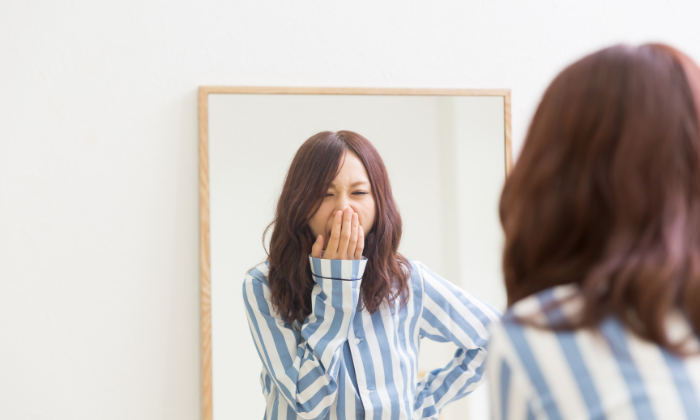By: Stephanie Ng, M.A. (Founder and Executive Director of Body Banter)
Body image is about more than what we see in the mirror. Body image is frequently understood as limited to how people view themselves in the mirror. Most people do not appreciate that it also encompasses how we feel about what we see, and how we feel in our bodies.
When seen this way, it is clear why sustaining positive perceptions of our bodies is integral to our sense of wellbeing - when we are accepting of our physical appearance and feel comfortable with the physical, emotional, and mental aspects of living in our bodies, we are more able to show up confidently for ourselves and others in our lives.

Although there are countless factors that can shape our body image perceptions, today’s blog post will focus on one in particular: sleep. Specifically, we will first discuss how sleep and body image perceptions can influence one another in reciprocal ways, and then explore how we can move toward improved well-being through addressing issues on both ends.
As anyone who has experienced a poor night’s sleep can attest to, waking up after a restless night will not only impact our physical energy levels, but also our mood and how motivated we feel. Studies suggest that poor sleep may lead to negative body image perceptions via a confluence of physical, mental, and emotional factors, and that this relationship is a two-way street.
On the one hand, the physical, mental, and emotional consequences of poor sleep may lead to a higher susceptibility of experiencing negative body image perceptions.
Specifically, sleep deprivation may result in actual changes to appearance (e.g., eye bags), a higher tendency to monitor one’s bodily sensations upon waking to check for signs of sleep deprivation (e.g., a feeling of heaviness in the body, sore eyes), which may combine to result in an increased likelihood of experiencing dissatisfaction with one’s body due to perceived physical flaws, in terms of appearance as well as the body’s ability to perform everyday tasks (1).

On the other hand, being dissatisfied with one’s body image can also lead to poor sleep, by way of being a stressor that significantly affects a person’s psychological wellbeing (2).
For instance, feeling worried about one’s physical appearance can lead to anxiety and negative affect that may impair a person’s sleep quality. Contrary to common belief, a person’s actual weight likely does not play a prominent role in the relationship between body dissatisfaction and psychological well-being.
This study (3) demonstrated that body dissatisfaction was linked to depressive symptoms, regardless of how much the person actually weighed, suggesting that it is the perception of the body as flawed (as opposed to any real physiological symptoms) that led to poor psychological health, and subsequently, poor sleep.

So, what can we do about it?
As we mentioned earlier, the relationship between sleep and body image is reciprocal. It is a two-way stream, and improving our wellbeing means addressing issues that occur from both angles.
When it comes to sleep, it is important to find practices and routines that are sustainable and flexible (i.e., that you can comfortably integrate into your lifestyle and that you are comfortable deviating from at times).
For example, you can experiment with using different tools or practices to help relax before bed. This can mean sipping a mug of tea before sleeping, using a weighted blanket, using an eye mask, or journaling before bed. Try to approach these experimentations with curiosity - if you try one method and it doesn’t work, simply move onto the next one! Enjoy the process of getting to know your body and what works for you.

When it comes to addressing issues related to body image and mental health, take a similarly curious approach. In a society that too often encourages efficiency and productivity at the cost of connecting with ourselves, it is likely that learning to tune into your physical and emotional sensations will take time.
Begin this process by exploring ways to connect your mind with your body, whether this is taking an unplugged walk in nature, practicing meditation, or responding consistently to your physical hunger cues with food that you enjoy.
Importantly, practice regularly taking the time to tune into how your physical sensations may be linked to your emotions. Through establishing this mind-body connection, you can start to trust that your body is a safe place to be, leading to decreased guilt and shame directed towards it, and you can also begin to tune into your physical sensations as a way of grounding yourself when you experience overwhelming emotions.
ABOUT STEPHANIE

Steph founded Body Banter in 2016 after realising the powerful role that discussion and advocacy played in her own eating disorder recovery journey. Through providing opportunities for community-building, advocacy and open discussion, she hopes that Body Banter can amplify the voices of individuals and empower them to be the driving forces behind creating a more accepting and accommodating world.
An avid mental health advocate, she is energised by her research in the areas of body image and eating disorders in Chinese contexts, and her role as the host of two podcasts exploring new ways of understanding mental health.
Her work has been featured on media platforms including BBC, Channel NewsAsia, and NowTV, and she recently co-authored a research paper published in the International Journal of Eating Disorders.
Body Banter is a Hong Kong-based nonprofit organisation that empowers people to find their voices in conversations about body image and mental health.
Learn more at bodybanter.com
References
Akram, U. (2017). Sleep associated monitoring on awakening mediates the relationship between cutaneous body image dissatisfaction and insomnia symptoms. Sleep Science, 10(2), 92-95.
Matias, T. D. S., Silva, K. S. D., Duca, G. F. D., Bertuol, C., Lopes, M. V. V., & Nahas, M. V. (2020). Attitudes towards body weight dissatisfaction associated with adolescents’ perceived health and sleep (PeNSE 2015). Ciencia & saude coletiva, 25, 1483-1490.
Richard, A., Rohrmann, S., Lohse, T., & Eichholzer, M. (2016). Is body weight dissatisfaction a predictor of depression independent of body mass index, sex and age? Results of a cross-sectional study. BMC public health, 16(1), 1-8.
